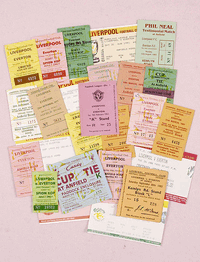
We’ve all been there. You’ve spent weeks and months trying to get hold of a ticket for an event you know is going to be popular. You wake up at 5am to get into the online queue for tickets and then can’t believe your luck when, hours later, you discover you’ve got the ticket you’ve always wanted.
Within an hour your boss calls and says you’ve got to work that day. If you don’t then you’ll be fired and you actually quite like your job, apart from when your work overlord makes random threats that you’re pretty sure he’s not allowed to make. Regardless, you stare at your newly acquired ticket with sadness in your eyes, hit with the knowledge that you won’t be attending this amazing event.
So what do you do? No one in your family likes football and all of your mates support a different team. There is that bloke down the road but he’s got weird facial hair and always seems to be staring at you when you walk past him in a way that makes you feel uncomfortable, so you’re not really sure that you want to give the ticket to him. Here we’ll tell you about the options you’ve got available to you. If you like spoilers then here’s one for you: There aren’t many options available to you.
Selling Your Ticket Could Get You In Trouble
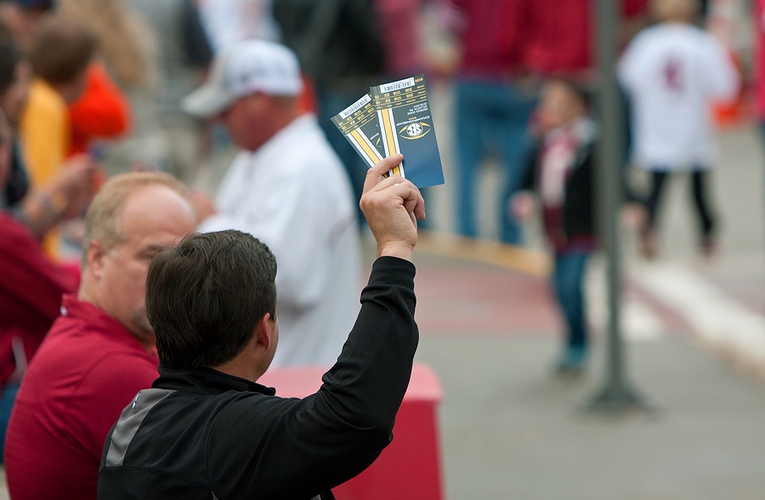
Football is, in plenty of different ways, not like anything else. If you had a ticket for a concert, a play, a cinema outing or even a rugby match then the likelihood is that you’d be able to sell your ticket on to someone else without fear of reprisals. You’d also be able to attend any of those events and have a drink whilst watching them, but that’s an argument for another time.
Football clubs have their own specific set of rules that they employ regarding the re-sale of tickets. They claim it’s in order to stop touting, but as we’ll explain later that’s really not the reason. Each club had their own set of terms and conditions regarding ticket sales, but the long and short of it is that you’re not allowed to do it unless the club has given you permission.
If you buy a ticket for a football match and can’t go then you’re pretty much stuffed. If you sell it on to someone else without the club’s permission, even if it’s at face value, then you can be banned from going to any more games and given a criminal conviction. Of course this very rarely happens and the likelihood is that you’d only get such a harsh punishment if you were trying to make some serious profit on your ticket, but that’s not the point. The point is that nearly all big club have it written into the terms of sale that you’re not allowed to sell the ticket to anyone else and if you do they can throw the book at you.
None of that is to say that it doesn’t happen. The truth is that most clubs turn a blind eye to such things, happily ignoring the movement of tickets between people as long as it all seems to be above board and friendly. They appreciate that over the course of a nineteen game home match season you might not be able to attend every match and so your friends or family might benefit. But even buying a ticket is a risk if the club decides to clampdown – something that is happening more and more frequently.
Third Party Sellers
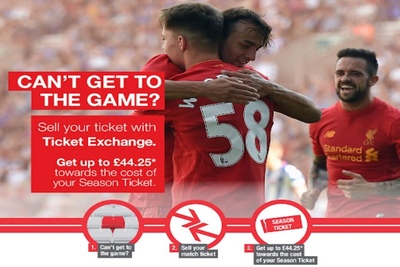 This is where things get interesting and, of course, slightly more complicated. In recent years there has been a proliferation of companies who use the ever-expanding World Wide Web to help put people who want to sell tickets in touch with people who want to buy them. These third-party re-sellers are all completely legal and above board for most things, but you’re still not technically allowed to sell your football tickets through them. Unless…
This is where things get interesting and, of course, slightly more complicated. In recent years there has been a proliferation of companies who use the ever-expanding World Wide Web to help put people who want to sell tickets in touch with people who want to buy them. These third-party re-sellers are all completely legal and above board for most things, but you’re still not technically allowed to sell your football tickets through them. Unless…
Some clubs have cottoned on to these ‘legalised touts’ and realised that they can make some money from them, so they’ve made deals with them to become their ‘official partner’. Viagogo, for example, has deals with Aston Villa, Chelsea, Fulham, Manchester City, Newcastle United, Queens Park Rangers, West Bromwich Albion, West Ham United, Wigan and Reading. Stubhub, another online re-seller, has deals with Sunderland Everton and Tottenham Hotspur.
Other clubs, like Arsenal and Liverpool, run their own ‘ticket exchange’, though these tend to be for season ticket holders. The idea is that you tell the club you can’t go and they sell your ticket for you, knocking money off the price of your season ticket for the following season in exchange.
Other Partners
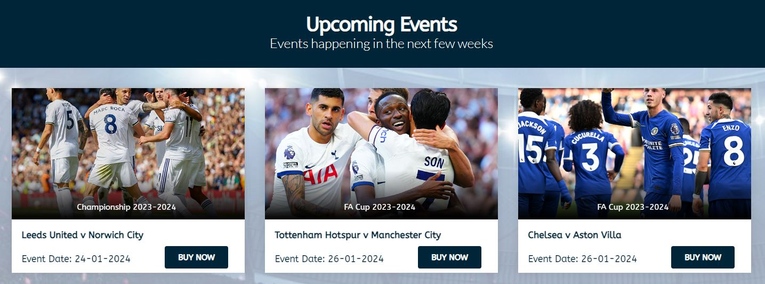
It is also now quite common place for clubs to have deals with big travel companies that have ‘sports sections’.
Thomas Cook Sport, for example, has a relationship with Liverpool FC that allows them to sell ‘packages’ to see Liverpool play at Anfield including travel, hotel and a match ticket.
The prices of all of these things would be significantly less if you bought them all yourself separately, but instead Thomas Cook puts a huge mark-up on them and essentially becomes a legalised tout.
As they appeal to the foreign fan the clubs really don’t mind.
Touts
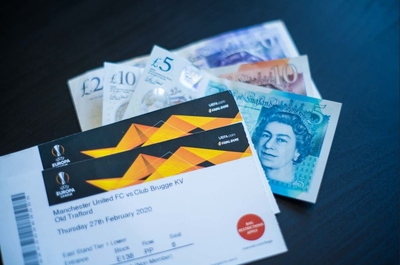
The other thing to be aware of in the ticket buying process is touts. These are people who offer tickets for games in exchange for cash.
In the past they would hang out outside grounds and let people know they had spare tickets, but with the expansion of the internet the have become a lot more intelligent and a lot less scrupulous.
The likes of Gumtree and Craigslist are often populated with tickets for games, but we would recommend you stay well clear of them.
Some of the tickets on sale on such website might be genuine, but most won’t be and if they’re not you’ll have no recourse to reclaim your money.
Buying tickets from unofficial and unregulated sources is risky at the best of times, but this is very much a no-no.
